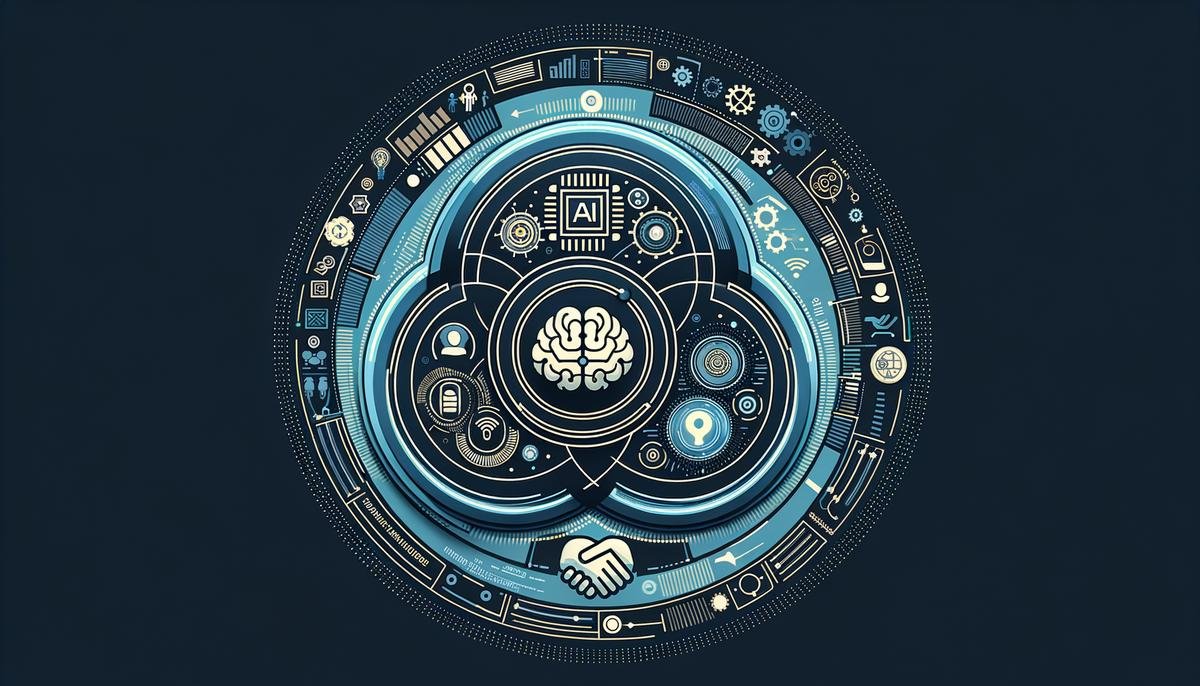Responsible AI Development
DeepMind's approach to AI development is guided by AI Principles and overseen by two key councils:
- Responsibility and Safety Council
- AGI Safety Council
These groups work to anticipate potential risks and ensure AI systems are developed responsibly.
Collaboration is a core aspect of DeepMind's strategy. The company partners with:
- Nonprofits
- Academics
- Businesses
This multi-faceted approach addresses AI-related risks from multiple angles, including supporting initiatives for diverse communities and providing scholarships for underrepresented individuals.
DeepMind's global reach extends to involvement in the Frontier Model Forum, a cross-industry group launched in 2023 to promote safe AI development. The lab has also proposed a three-layered framework for evaluating AI systems, covering:
- Capability
- Human interaction
- Systemic impacts

Transparency and Accountability
DeepMind faces scrutiny regarding transparency and accountability in AI development. The lab is working towards greater openness about its AI models, balancing proprietary innovation with public accountability. This includes offering prioritized access to its models for government oversight and research.
However, critics argue that without comprehensive explanations of AI model training, including data sources and methods, claims of openness can seem inadequate. There's a need for explanations that link these models' functions to real-world effects.
"We urgently need rigorous and comprehensive evaluations of AI system safety that take into account how these systems may be used and embedded in society."
In response, DeepMind has committed to:
- Publishing more research papers
- Engaging with varied stakeholders
- Subjecting its next major project, the Gemini AI chatbot, to rigorous ethical checks
This new, more open phase in DeepMind's development serves as a test for their commitment to transparency and responsible AI practices.

Ethical Challenges and Military Contracts
DeepMind faces internal conflict regarding its parent company Google's engagement with military organizations. This issue stems from promises made when Google acquired DeepMind in 2014 that its technologies would never be used for military purposes.
Nearly 200 workers within Google's DeepMind openly challenged the company's direction, expressing unease over Google Cloud's involvement in projects like Project Nimbus, which supply cloud and AI services to military organizations.
Google's response has been to assert that these contracts do not directly involve DeepMind's AI in highly sensitive applications. However, this reassurance has done little to address:
- Employee dissatisfaction
- Public skepticism
The situation underscores the ethical challenges facing AI development and reflects a growing need for stronger governance structures that can effectively mediate between corporate goals and ethical commitments.

Evaluating AI Risks
DeepMind's approach to evaluating AI risks involves a comprehensive three-layered framework examining:
- AI system capabilities
- Human interaction
- Systemic impacts
This methodology aims to provide a fuller picture of potential hazards and opportunities beyond technical capabilities.
The framework addresses critical gaps in existing safety evaluations, such as:
- The tendency to isolate AI capabilities from their broader context
- Overlooking more nuanced forms of negative impact
It emphasizes the need for context-driven approaches and considers the long-term effects of AI systems on various aspects of society.
By stressing the significance of context and systemic evaluation, DeepMind urges the industry to move beyond isolated technical assessments, seeking a more holistic understanding of AI's place in human society.

Future of AI Assistants
AI assistants are set to become essential parts of daily life, offering enhanced productivity and creativity. However, their evolution brings potential challenges that require careful oversight.
Key concerns include:
- Aligning AI actions with human values and objectives
- Establishing safeguards to limit AI actions based on user priorities
- Anticipating and managing socio-technical impacts on employment, social behaviors, and economic structures
The development of AI assistants should follow principles prioritizing human dignity and societal harmony, evaluating each advance through ethical responsibility and practical utility lenses. The challenge is to balance AI assistants' ability to amplify human capabilities while guarding against potential misuse.

As AI progresses, balancing innovation with ethical considerations remains crucial. The focus on responsible AI practices emphasizes the importance of aligning technological progress with societal values, ensuring that advancements benefit humanity as a whole.
- DeepMind. Our approach to AI ethics and governance. DeepMind website.
- DeepMind. Introducing a context-based framework for comprehensively evaluating the social and ethical risks of AI systems. DeepMind website.
- DeepMind. Exploring the promise and risks of a future with more capable AI. DeepMind website.
- Wiggers K. DeepMind proposes a framework for evaluating AI risks. TechCrunch.
- Hao K. Nearly 200 Google DeepMind employees signed a letter urging the company to drop military contracts. TIME.




